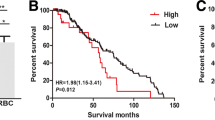Abstract
Various studies in western countries found Akt amplification to be a frequent event in human cancers, including bladder, but the correlation with clinicopathological features is controversial. Such studies have not been reported in African populations, including Tunisians. The purpose of this study was to assess expression of the phosphorylated/activated forms of Akt in tumors from Tunisian patients with bladder cancer and to correlate its expression with pathological and clinical parameters of the disease. The study included 72 patients of whom 34 were diagnosed as low- to medium-grade and 35 as high-grade; 30 were muscle stage and 39 non-muscle stage. Primary tumors from these patients, normal adjacent tissues, or bladder cancer cell-lines were analyzed for Ser473 phosphorylated Akt expression by Western blot. Seventy-two percent of primary tumors from patients with bladder cancer had increased levels of p-Akt. The p-Akt levels in patients with high-grade bladder cancer were significantly elevated compared to patients with low- or medium-grade bladder cancer. In invasive carcinoma, the p-Akt level was significantly higher than in superficial non-invasive bladder tumors. Concerning the influence of tobacco on Akt activation, no significant differences of p-Akt expression were found between non-smoker and smoker patients. Altogether, our results suggest that Akt activation can provide useful prognostic information and that tobacco represents a serious risk factor for recurrence in a cohort of Tunisian patients.




Similar content being viewed by others
References
Kaufman DS, Shipley WU, Feldman AS. Bladder cancer. Lancet. 2009;374(59685):239–49.
Stewart WF, Van Rooyen JB, Cundiff GW, Abrams P, Herzog AR, Corey R, et al. Prevalence and burden of overactive bladder in the United States. World J Urol. 2003;20(6):327–36.
Harry WH. Tumor progression and survival of patients with high grade, noninvasive papillary (tag3) ladder tumors: 15-year outcome. J Urol. 2000;163(1):60–2.
McConkey DJ, Lee S, Choi W, Tran M, Majewski T, Lee S, et al. Molecular genetics of bladder cancer: emerging mechanisms of tumor initiation and progression. Urol Oncol: Semin Original Investig. 2010;28(4):429–40.
Choa TM, Kimb WJ, Moon SK. AKT signaling is involved in fucoidan-induced inhibition of growth and migration of human bladder cancer cells. Food Chem Toxicol. 2014;64:344–52.
Manning BD, Cantley LC. AKT/PKB signaling: navigating downstream. Cell. 2007;129(7):1261–74.
Brazil DP, Park J, Hemmings BA. PKB binding proteins. Getting in on the Akt. Cell. 2002;111(3):293–303.
Porta C, Paglino CC, Mosca A. Targeting PI3K/Akt/mTOR signaling in cancer. Front Oncol. 2014;4:64–74.
Calderaro J, Rebouissou S, Koning DL, Masmoudi A, Herault A, Dubois T, et al. PI3K/AKT pathway activation in bladder carcinogenesis. Int J Cancer. 2014;134(8):76–1784.
Cheng JQ, Ruggerit B, Klein WM, Sonoda G, Altomare DA, Watsont DK, et al. Amplification of AKT2 in human pancreatic cells and inhibition of AKT2 expression and tumorigenicity by antisense RNA. Proc Natl Acad Sci U S A. 1996;93(8):3636–41.
Cheng JQ, Godwin AK, Bellacosa A, Taguchi T, Franke TF, Hamilton TC, et al. AKT2, a putative oncogene encoding a member of a subfamily of protein-serine/threonine kinases, is amplified in human ovarian carcinomas. Proc Natl Acad Sci U S A. 1992;89(19):9267–71.
Osaki M, Oshimura M, Ito H. PI3K-Akt pathway: its functions and alterations in human cancer. Apoptosis. 2004;9(6):667–76.
Sarkar FH, Li Y. Indole-3-carbinol and prostate cancer. J Nutr. 2004;134(12):3493–8.
Kausch I, Böhle A. Molecular aspects of bladder cancer III. Prognostic markers of bladder cancer. Eur Urol. 2002;4(1):15–29.
Sun CH, Chang YH, Pan CC. Activation of the PI3K/Akt/mTOR pathway correlates with tumour progression and reduced survival in patients with urothelial carcinoma of the urinary bladder. Histopathology. 2011;58(7):1365–2559.
Porta C, Figlin RA. Phosphatidylinositol-3-Kinase/Akt signaling pathway and kidney cancer, and the therapeutic potential of Phosphatidylinositol-3-Kinase/Akt inhibitors. J Urol. 2009;182(6):2569–77.
Wu X, Obata T, Khan Q, Highshaw RA, De Vere White R, Sweeney C. The phosphatidylinositol-3 kinase pathway regulates bladder cancer cell invasion. BJU Int. 2004;93(1):143–50.
Korkolopoulou P, Levidou G, Trigka EA, Prekete N, Karlou M, Thymara I, et al. A comprehensive immunohistochemical and molecular approach to the PI3K/AKT/mTOR (phosphoinositide 3-kinase/v-akt murine thymoma viral oncogene/mammalian target of rapamycin) pathway in bladder urothelial carcinoma. BJU Int. 2012;110(11):1237–48.
Schultz L, Albadine R, Hicks J, Jadallah S, DeMarzo AM, Chen YB, et al. Expression status and prognostic significance of mammalian target of rapamycin pathway members in urothelial carcinoma of urinary bladder after cystectomy. Cancer. 2010;116(23):5517–26.
Juanpere N, Agell L, Lorenzo M, de Muga S, López-Vilaró L, Murillo R, et al. Mutations in FGFR3 and PIK3CA, singly or combined with RAS and AKT1, are associated with AKT but not with MAPK pathway activation in urothelial bladder cancer. Hum Pathol. 2012;43(10):3–82.
Zhai B, Jiang X, He C, Zhao D, Ma L, Xu L, et al. Arsenic trioxide potentiates the anti-caner activities of sorafenib against hepatocellular carcinoma by inhibiting Akt activation. Tumour Biol. 2015;36(4):2323–34.
Acknowledgments
We thank Catherine Paul (Laboratoire d’Immunologie et Immunothérapie des Cancers, EA 7269, Université de Bourgogne, Dijon) for proofreading the paper. This study was supported by the “Ministère de l’Enseignement Supérieur et de la Recherche” of Tunisia (Ben Bahria-Sediki); the “Fonds européen de développement régional (FEDER)” no. 2013-0431SGO003S03654 and 2014-9201AAO049S02145 (Sampaio), and the “Région de Bourgogne” (Ben bahria-Sediki, Sampaio, Bettaieb).
Author information
Authors and Affiliations
Corresponding authors
Ethics declarations
Informed consent was obtained from all patients before enrolment in the study. This study is in agreement with the Declaration of Helsinki and was approved by the Ethical Committee of the Tunis Pasteur Institute.
Rights and permissions
About this article
Cite this article
Ben Bahria-Sediki, I., Sampaio, C., Chebil, M. et al. Akt activation correlates with the tumor aggressiveness in Tunisian patients with bladder cancer. Tumor Biol. 37, 7873–7879 (2016). https://doi.org/10.1007/s13277-015-4678-2
Received:
Accepted:
Published:
Issue Date:
DOI: https://doi.org/10.1007/s13277-015-4678-2




